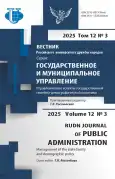The factors of formation of a procreative attitude in the context of demographic transition
- 作者: Beduleva M.A.1
-
隶属关系:
- Ural Federal University named after the first President of Russia B.N. Yeltsin
- 期: 卷 12, 编号 3 (2025): MANAGEMENT OF THE STATE FAMILY AND DEMOGRAPHIC POLICY
- 页面: 328-340
- 栏目: MANAGEMENT OF THE STATE FAMILY AND DEMOGRAPHIC POLICY
- URL: https://bakhtiniada.ru/2312-8313/article/view/349657
- DOI: https://doi.org/10.22363/2312-8313-2025-12-3-328-340
- EDN: https://elibrary.ru/BXQCYQ
- ID: 349657
如何引用文章
详细
The study tries to determine the priority of factors affecting the birth rate. The author emphasizes the paramount importance of the stage of the demographic transition in the formation of the procreative attitude as an objective factor, which a woman cannot alter. In addition to the objective factor the research shows the impact of a subjective nature on the formation of the procreative factors, which include age, marriage, interests and values of a woman. It is substantiated that subjective factors can provide a corrective value for the procreative attitude of a woman in the conditions of a specific stage of the demographic transition. The author analyses the process of shift of the birth rate in the older age group of youth, the effect of the stability of marriage on the birth rate. The values of the demographic transition are emphasized not only as an objective prerequisite for the formation of the proсreative attitude, but also as a prerequisite for the formation of a human resource in the field of labor activity. The author shows the decisive influence of the stage of the demographic transition on the current state of the institution of the family, on the specifics of the material and spiritual needs of a modern human. Thus, it is emphasized that the demographic transition, as a modern feature of the mortality and fertility rates, is of global importance, influencing the formation of the entire system of vital activity of modern society.
作者简介
Marina Beduleva
Ural Federal University named after the first President of Russia B.N. Yeltsin
编辑信件的主要联系方式.
Email: mar-beduleva@yandex.ru
ORCID iD: 0009-0008-8963-083X
SPIN 代码: 4053-3825
Candidate of Philosophical Sciences, Associate Professor of the Department of Youth Work Organization
51 Lenin st., Yekaterinburg, 620075, Russian Federation参考
- Uznadze DN, Imedadze IV (ed.). Obshchaya psikhologiya [General psychology]. Chomakhidze ESh, translator from Georgian. Мoscow: Smysl publ.; 2004. (In Russ.). EDN: QXJEZR
- Vishvevsky AG. The demographic revolution is changing the reproductive strategy of homo sapiens. Demographic Review. 2014;1(1):6–33. (In Russ.). EDN: TLMUVV
- Zvidrinysh PP, Zvidrinya MA. Naselenie i ekonomika [Population and economy]. Moscow: Mysl’ publ.; 1987. (In Russ.).
- Van de Kaa DJ. Europe’s second demographic transition. Population Bulletin. 1987;42(1):1–59.
- Coleman D. Immigration and ethnic change in low-fertility countries: A third demographic transition. Population and Development Review. 2006;32(3):401–446. https://doi.org/10.1111/j.1728-4457.2006.00131.x EDN: YYNFBR
- Borisov VA. Etyud po istorii i filosofii kontratseptsii [An etude on the history and philosophy of contraception]. In Borisov VA (ed). Demograficheskaya dezorganizatsiya Rossii: 1897–2007: izbrannye demograficheskie trudy [Demographic disorganisation of Russia: 1897–2007: selected demographic works]. Moscow: Notabene publ.; 2007: 463–500. (In Russ.).
- Engel’s F. Predislovenie k pervomu izdaniyu raboty «Proiskhozhdenie sem’i, chastnoi sobstvennosti i gosudarstva» [Preface to the first edition of The Origin of the Family, Private Property and the State]. In K. Marks i F. Engel’s. Sochineniya [К. Marx and F. Engels. Works]. 2nd ed. Moscow: Politizdat publ.; 1962;21:V–XV. (In Russ.).
- Marks K. Feerbakh. Protivopolozhnost’ materialisticheskogo i idealisticheskogo vozzrenii [Feuerbach. Opposition of materialistic and idealistic views]. K. Marks, F. Ehngel’s. Izbrannye proizvedeniya : v 3 tomah. [К. Marx, F. Engels. Selected works: in 3 vols]. Moscow: Politizdat publ.; 1979;1:22–145. (In Russ.).
- Roser M, Ritchie H. How has world population growth changed over time? In: Roser M, Ritchie H. Our World in Data, 2023. URL: https://ourworldindata.org/population-growth-over-time (accessed: 10.04.2025).
- Zakharov SV. Prospects for fertility in Russia: the second demographic transition. Otechestvennye Zapiski: the Journal of Russian Thought. 2005;(3):9–36. (In Russ.).
- Kozlova OA, Sekitski-Pavlenko OO. Patterns of birth rate and reproductive behavior of Russian female population: current trends. Economic and Social Changes: Facts, Trends, Forecast. 2020;13(5):218–231. (In Russ.). https://doi.org/10.15838/esc.2020.5.71.13 EDN: QQAQIY
- Arkhangel’skii VN. Reproductive and mating behaviour. Sociological Research. 2013;(2):129–136. (In Russ.). EDN: PWUQRT
- Vishnevskii YuR, Narkhov DYu (eds). Sotsial’noe samochuvstvie molodezhi Sverdlovskoi oblasti v 2015 godu: Itogi sotsiologicheskogo issledovaniya [Social well-being of young people in the Sverdlovsk Region in 2015: Results of a sociological survey]. Yekaterinburg: Izd-vo UMTS UPI publ.; 2016:179. (In Russ.).
- Otchet o vypolnenii nauchno-issledovatel’skikh rabot po teme «Polozhenie molodezhi Sverdlovskoi oblasti v 2024 godu: nauchnye osnovy dlya doklada Pravitel’stvu Sverdlovskoi oblasti» [Report on research work on the topic “The State of Youth in the Sverdlovsk Region in 2024: Scientific Basis for a Report to the Government of the Sverdlovsk Region”]. Yekaterinburg; 2024. URL: https://molodost.ru/wp-content/uploads/2025/02/otchet-o-vypolnenii-nauchno-issledovatelskih-rabot.pdf (accessed: 03.02.2025). (In Russ.).
- Kalachikova ON, Shabunova AA. Reproduktivnoe povedenie kak faktor vosproizvodstva naseleniya: tendentsii i perspektivy [Reproductive behaviour as a factor of population reproduction: trends and prospects]. Vologda: FGBUN VoLNTS RAN publ.; 2015. (In Russ.). EDN: TXDCGL
- Rostovskaya TK, Kuchmaeva OV, Zolotareva OA. Assessment of demographic attitudes in the eyes of men and women under conditions of fertility deficit. Zhenshchina v rossiiskom obshchestve. 2020;Special Issue:121–135. (In Russ.).
- Mamikoyan OV. 2024 godu v Rossii raspalis’ vosem’ iz 10 brakov [In 2024, eight out of 10 marriages will break up in Russia]. Forbes Life. 2024. (In Russ.). URL: https://www.forbes.ru/forbeslife/527483-v-2024-godu-v-rossii-raspadalis-vosem-iz-10brak ov (accessed: 25.02.2025).
- Sinel’nikov AB. Social acceptability of objective and subjective reasons for divorce in modern Russia. Sociological Research. 2023;(4):75–83. https://doi.org/10.31857/S013216250022703-6 (In Russ.).
补充文件










